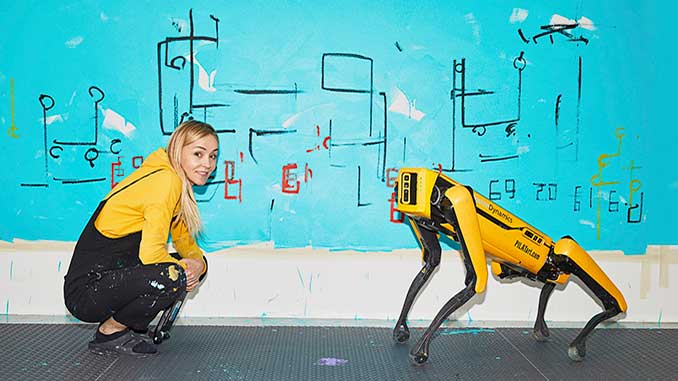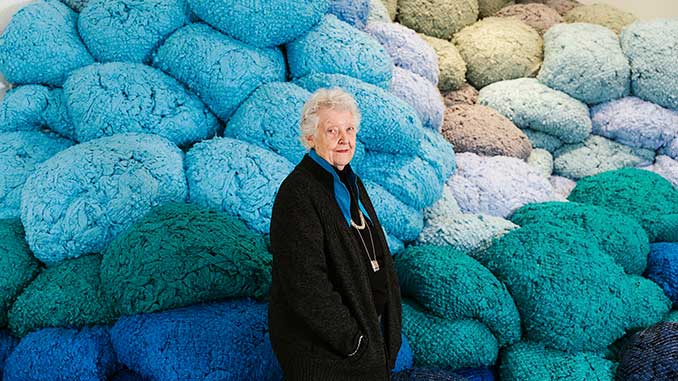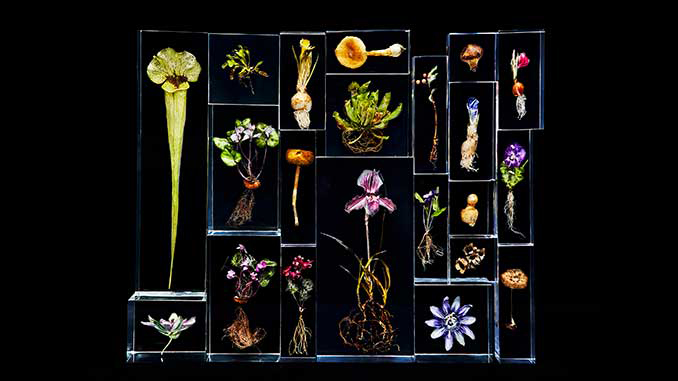 From robotics to tapestry, weather patterns to war, mysticism to megacities – NGV Triennial 2023 is a powerful and moving snapshot of the world today as captured through the work of 100 artists, designers and collectives at the forefront of global contemporary practice.
From robotics to tapestry, weather patterns to war, mysticism to megacities – NGV Triennial 2023 is a powerful and moving snapshot of the world today as captured through the work of 100 artists, designers and collectives at the forefront of global contemporary practice.
Bringing contemporary art, design and architecture into dialogue with one another and traversing all four levels of NGV International, the NGV Triennial features more than 75 extraordinary projects that invite us to reflect on the world as it is, while also asking how we would like it to be.
Featured artists include: Sheila Hicks (USA), Tracey Emin (UK), Petrit Halilaj (Kosovo), Betty Muffler (Australia), Yoko Ono (Japan), David Shrigley (UK), Schiaparelli (France), Agnieszka Pilat (Poland), Hoda Afshar (Iran), Thomas J Price (UK), Fernando Laposse (Mexico), Azuma Makoto (Japan), Flora Yukhnovich (UK), Yee I-Lann (Malaysia), Farrokh Mahdavi (Iran), Heather B Swann (Australia), Hugh Hayden (USA), Joyce Ho (Taiwan), Shakuntala Kulkarni (India), SMACK (Netherlands), Yinka Shonibare (UK), Tao Hui (China); Diedrick Brackens (USA) and many more.
With more than 25 world-premiere projects commissioned by the NGV especially for this presentation, the NGV Triennial reveals the extraordinary ways in which leading and emerging artists and designers have responded to the most relevant and critical global issues of our time.
With many of the works on display entering the NGV Collection, the NGV Triennial establishes a lasting legacy for Victoria that can be accessed for many generations to come.
Polish-born Agnieszka Pilat will train Boston Dynamics robot dogs to paint autonomously – a breakthrough in her practice that explores power of technology in contemporary society.
Over four months, audiences can witness the robot dogs painting a monolithic durational work. Pilat imagines that in a distant future these paintings will be revered as the first primitive art-making of AI enabled robots.
In a special collaboration with Paris haute couture house Schiaparelli, the NGV has invited artistic director Daniel Roseberry to present a selection of works from recent collections alongside a collection of gilded surrealist accessories and body adornment.
Presented within an immersive and celestial environment, the display highlights Roseberry’s interest in pushing the boundaries of couture practice, the elemental, and his view that art and fashion can question, shape and address the concerns of contemporary life.
Counter-culture icon Yoko Ono will present a large-scale text-based work on the NGV International façade. The multi-media artist who works in performance, instruction, film, installation, music, and writing, will draw upon her Instruction Pieces and major public art commissions around the world for this poignant work. Ono’s text works speak to her conceptual practice of over 60 years, and offer declarative, poetic, confessional and political commentary.
NGV Triennial will also present an exciting selection of recently acquired work by British artist Tracey Emin, whose autobiographical and confessional practice spans film, painting, drawing, installation and sculpture.
Highlights include a five-metre-high text-based neon light installation of Emin’s own handwriting, abstract and tactile bronze sculptures, plus gestural and figurative paintings that confront moments of extreme emotion, anguish, elation or pain.
 Senior Paris-based and American-born sculptor Sheila Hicks presents Nowhere to Go, 2022, a major sculptural installation utilising Hicks’ signature bulbous forms of brightly coloured fibre. Stacked high against a wall, the forms gather to create an imposing and yet playful installation that celebrates the experience of architectural space and the emotional potential of colour.
Senior Paris-based and American-born sculptor Sheila Hicks presents Nowhere to Go, 2022, a major sculptural installation utilising Hicks’ signature bulbous forms of brightly coloured fibre. Stacked high against a wall, the forms gather to create an imposing and yet playful installation that celebrates the experience of architectural space and the emotional potential of colour.
David Shrigley OBE, known for his darkly humorous artworks which reflect on the banality and absurdity of everyday life, presents his monumental public sculpture, Really Good, 2016. The work was originally conceived for the Fourth Plinth in London’s iconic Trafalgar Square, in the immediate aftermath of the UK’s decision to leave the EU.
Taking the form of a seven-metre-high thumbs-up, the sculpture is characteristic of the self-conscious irony often found in Shrigley’s work and is intended as both a satirical and sincere gesture.
Collaborators Elmgreen and Dragset offer a dynamic sculptural installation where multiple works combine to traverse the artists’ unique approach to sculpture and installation. The Painter, Fig. 1, 2021, depicts a male figure, barefoot and shirtless, caught in the process of making a sweeping black mark across a white canvas.
In The Balcony, a figure leans out from above to photograph the audience. Above it all is What’s left?, a tightrope stretched across the void, a lone figure clings to the rope, seemingly to drop at any moment, to a tragic fate.
Other highlights include Mun-dirra, a monumental one-hundred-metre-long woven fish fence which was produced over two years by ten artists working with apprentices in Maningrida, Arnhem Land. The immersive installation, which invites audiences inside it, represents one of the two common types of fish traps produced in the area.
The weavers are from the Burarra language group from the east-side Arnhem Land who specialise in the customary weaving. The artists use the woven form to tell a powerful story of matrilineal knowledge transference, as well as how Yolngu people have lived sustainably with the land for generations.
 For the NGV Triennial, Tokyo-based artist Azuma Makoto will present a room sized installation as an homage to the magical beauty and lifeforce of plants. After freezing a multitude of Australian flowers and botanicals into crystalline acrylic blocks, the artist places these jewel-like sculptural elements in dialogue with a beguiling multi-screen film depicting the life and death of flowers. Makoto asks us to explore the complex and fragile relationship between humans and plants.
For the NGV Triennial, Tokyo-based artist Azuma Makoto will present a room sized installation as an homage to the magical beauty and lifeforce of plants. After freezing a multitude of Australian flowers and botanicals into crystalline acrylic blocks, the artist places these jewel-like sculptural elements in dialogue with a beguiling multi-screen film depicting the life and death of flowers. Makoto asks us to explore the complex and fragile relationship between humans and plants.
American artist Hugh Hayden, whose work explores ideas of class, race, education and cultural assimilation, will exhibit his 2022 installation, The end, for the NGV Triennial. Taking over an entire gallery space, the work depicts an apocalyptic elementary school classroom – replete with desks and chairs – that has been overrun with branches and dodo skeletons.
Also on display will be Hayden’s 2020 work The Cosby’s, which comprises a series of cast iron skillets that have been reimagined as West African masks– a commentary on the cultural impact of the African diaspora on American entertainment, food, industry, and society.
Megacities is large-scale, NGV-commissioned presentation that invites ten leading street photographers to capture the urban environment of ten global megacities, with a population exceeding 10 million: Cairo, Dhaka, Jakarta, Delhi, Sao Paulo, Shanghai, Seoul, Lagos, Tokyo and Mexico City.
Working collaboratively with the NGV, the photographers will stage their work in a dynamic, immersive environment and present a thought-provoking fact of the twenty-first century, an urban phenomenon – enunciating that for the first time in history the dominant human habitat is the city, and that we are rapidly becoming an urban species.
Three key thematic pillars of Magic, Matter and Memory anchor the 2023 NGV Triennial. Rather than forming a structure for the exhibition’s organisation and the selection of works, the themes offer insight into the concerns of the artists and designers in the exhibition.
The three themes are entangled discourses that flow between and across the projects within the exhibition. The theme of Magic delves into belief systems, allegory and symbolism, revealing some of the ways that human spirituality has shaped the world around us.
Matter draws together nature, materials and making, highlighting the central role that materials and the natural world play in shaping human culture. Finally, Memory shines a light on both the histories of people, places and objects that make up the complex tapestry of our contemporary world.
“In the three years since the last NGV Triennial, the world has experienced a great many structural shifts, including a global pandemic,” said Tony Ellwood AM, Director NGV.
“Through the work of more than 100 artists, designers, architects and collectives from Australia and around the world, the NGV Triennial offers a powerful insight into the ideas and concerns empowering creative practice in 2023.”
“The artists, designers and architects of our time play an important role in helping us to understand, navigate and relate to the world around us.”
“The 2023 NGV Triennial offers audiences a valuable opportunity to experience new and surprising forms of creative expression from around the globe, which, together, present a compelling snapshot of the world as it is, while also asking how we would like it to be,” said Mr Ellwood.
NGV Triennial 2023
NGV International, St Kilda Road, Melbourne
Exhibition: 3 December 2023 – 7 April 2024
Free entry
For more information and full program, visit: NGV.MELBOURNE for details.
Images: Agnieszka Pilat – photo by Aaron Richter | Portrait of Sheila Hicks – courtesy the artist and Alison Jacques | Azuma Makoto, Block Flowers, 2020 © Azuma Makoto – courtesy the artist
